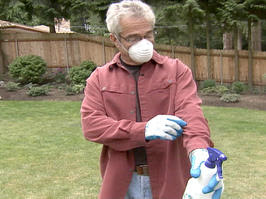Learn the differences between synthetic and organic chemicals!!!!
Millions of gardeners distinguish between synthetic and natural products by calling the former chemicals and the latter organics. The truth is they're all chemicals.The difference is that synthetic chemicals are man-made, whereas organic chemicals are derived from natural sources. As a result, most people think that all synthetic chemicals are toxic, and all organic chemicals are safe
Millions of gardeners distinguish between synthetic and natural products by calling the former chemicals and the latter organics. The truth is they're all chemicals.The difference is that synthetic chemicals are man-made, whereas organic chemicals are derived from natural sources. As a result, most people think that all synthetic chemicals are toxic, and all organic chemicals are safe
In fact, there are organic chemicals that are every bit as dangerous as synthetic chemicals, yet people who use them assume – often incorrectly – that because something is labeled organic it must therefore be safe!!!
- Regardless of which type of chemical you choose to use, make sure you
read the product label carefully and follow the instructions. Don't
assume that if two tablespoons per gallon is called for, then four tablespoons
must be twice as good. It doesn’t work that way, and the results of using such a
mixture can be dangerous to you and your plants.
- Don't combine chemicals. In other words, don't mix an insecticide
with an herbicide in an attempt to destroy both insects and weeds in one fell
swoop. Certain chemical combinations can be dangerous.
- Understand what the chemicals do. A number of organic chemicals are
just as non-selective or indiscriminate as their synthetic counterparts. For
example, Bacillus thuringiensis, or BT, the popular bacterial pesticide
that controls caterpillars, doesn't distinguish between the larval form of the
destructive cabbage looper and the monarch butterfly. It kills them both. The
same is true of garlic oil, a popular organic insecticide that is equally
effective against both pests and beneficial insects.
- Whether you use synthetic or organic chemicals in your landscape, take physical precautions. Wear a long-sleeved shirt, long pants, gloves, and perhaps even a mask. And when you've finished spraying or dusting, wash your hands thoroughly.
- solution!!!!
Synthetic Chemicals, Compost and Your Soil
To have healthy soil, ditch the synthetic fertilizers and bring on the compost.
-
The secret to successful gardening is healthy soil. In a single tablespoon of healthy soil, there are literally billions of organisms — from protozoa and nematodes to bacteria and fungi — that together form interdependent food chains.In other words, the soil itself is a living organism, and it needs to be treated as such. But every year many gardeners destroy the vital soil food web by using synthetic chemicals, specifically synthetic fertilizers.The frequent use of synthetic fertilizers leads to an accumulation of soluble salts, and those salts are toxic to the organisms of the soil food web. That leads to a variety of problems, including decreased soil fertility, a lack of vigor, lower yields, reduced flowering and greater susceptibility to pests and diseases.So if you've been relying on synthetic fertilizers, consider making the switch to organic products, and use the one thing that can keep your soil healthy: compost. Compost teems with all the organisms that make up the soil food web. When applied routinely to the soil, whether around the base of plants or spread evenly over an entire garden bed, compost makes soil come alive. And in the process, it creates conditions that lead to healthier, happier plants with amazing vigor and the ability to ward off pests and diseases

